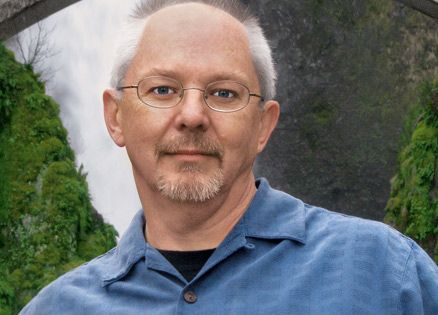One phone call.
No doubt you’ve heard those overnight success stories–the actor getting the breakthrough part, the struggling musician whose song everyone is suddenly talking about.
The book I’ve written, The Shack, has proved to be hugely successful in ways that I couldn’t possibly have imagined.
But the phone call that got it all started was something that threw my ordered world–what I desperately wanted people to believe was ordered–into pain and chaos long before I ever put pen to paper.
I was an insurance agent, supporting my wife, Kim, and our six kids, the picture-perfect husband and provider. Framed family photos on the desk, the kids stretching from ages one to 14.
I took them on camping trips up the Columbia Gorge and told them bedtime stories. I wanted to give them the safe, secure childhood I’d never had and never talked about.
But the terror of my past was rarely far beneath the surface, no matter how hard I tried to hide it. I was always running from half-buried memories, haunted by doubts, doubts that said if anyone really knew who I was deep inside, no one could possibly love that damaged and frightened person.
January 4, 1994, one phone call changed everything. I was just finishing lunch with a friend and Kim was on the line. “Hi, darling,” I said, waiting to hear some detail about the kids’ soccer games or a meeting with a teacher or a question about dinner–was I going to be home late again?
“I’m here in your office,” she said, her voice like cold steel, “and I’m waiting for you.”
“What’s wrong?”
“I know.” Then she hung up. The air was sucked out of the room. I wanted to keep maintaining the fiction of our perfect marriage because it was all I really had in life.
I wanted to hide, because hiding and lying were what I knew how to do best. I could appear to be the model Christian dad. I was the son of missionary parents, a Bible school graduate, a former seminary student.
Kim and I had actually met at a church when I had a staff position in charge of the college youth group. She walked into a Friday evening meeting with two of her sisters. One look at her raven hair and dark searching eyes and I changed what I had planned.
“Why don’t we split up into groups of two and pray for each other?” I said. Of course, I paired myself with Kim.
She knows, I thought now. I wanted to run away, but that would solve nothing. You can’t run from your own sorry self.
The next thought was ending my life, the ultimate form of self-centered running away.
Perhaps it was a nudge of grace, but I finally decided I had to face Kim, even if the anger in her voice terrified me.
All the secrets had to come out, all those things that had happened to me so long ago yet still seemed so much a part of the present, my behaviors and addictions I could never talk about. It was all or nothing.
The trip to the office was one of the longest of my life. I pulled into the parking lot and slunk out of the car. I pushed open the door.
The place was a shambles. Files thrown on the floor, drawers open, paperclips and pens dumped on the carpet, the trash can knocked over, memos ripped off my bulletin board.
In the middle of it all sat Kim at my computer. She knew I was having an affair with one of her best friends. All the e-mails between us were there for anyone to find. Was I secretly hoping to get caught? The guilty, they say, seek punishment.
“How could you? How could you betray me like this?” Kim shouted.
I couldn’t meet her scorching gaze. I couldn’t bear seeing the pain in those dark eyes. Pathetically, I promised that I would end it right away, that I’d never let it happen again.
“Why should I believe you?”
Why indeed? I didn’t even trust myself. I was in no position to promise anything. But I did make one pledge: “I don’t want to be like this, Kim. I love you. I’ll do anything to keep you.
“I’ll find the best counselor I can and work with him. I want to change, and there’s so much I need to tell you. Secrets have been killing me my whole life and if we are going to do this, I can’t have any more secrets.”
After hours of intense interrogation, laced with fury and grief, Kim was done. “I will never believe another thing that comes out of your mouth the rest of your life,” she declared. I reached out to hug her, just touch her and hold on, but she stood up and pushed her way past, slamming the door in tears.
And there I was, left to myself and the mess in my office, the mess in my life. The mess that was inside me. All my life I’d heard people say God loved us–that God loved me–but I’d never really believed it. How could I? I didn’t love myself. What could God love about me, especially now?
Over the next three days I tried to talk to Kim. Why not tell her the truth? But she didn’t want to hear it. I was terrified I’d lost her already.
In desperation I started seeing a therapist, two to three times a week. For the first time I asked another human being to enter into my life and help me heal. It was the first I’d told anyone what had happened to me as a boy growing up in New Guinea.
My parents were missionaries to a primitive people and in those days missionary children were only allowed to be with their parents until they reached school age. At six I was sent to a boarding school.
Sexual abuse that had already been occurring at the hands of the tribe since I was four now continued at the missionary school. I was terrorized, brutalized, dehumanized.
The deep examination of what I had undergone nauseated me. Shame had become the very air I breathed, just another word for self-hatred. But if I were to change, if I were to heal, I would have to face the worst.
It didn’t excuse my ugly behavior–nothing did–but it helped me to understand the duplicity, the fear, the loneliness–all the defense mechanisms that protected me as an abused child but were destroying me as an adult. I needed to get honest, with myself, with Kim, with God, with everyone.
At night, at home, after the children had gone to bed, I would tell Kim what I had told the therapist: the horrible stuff I had been running away from for over 30 years. She would listen, but barely respond.
My despair grew. I couldn’t heal her any more than I could heal myself. And night after night, I felt I was slowly losing myself–that if I kept up the truth-telling, there would be nothing of me left, the layers peeled back with nothing at the center.
Where were the people who should have protected me as a child? Where was God? Didn’t anyone care at all? For the first time I allowed my anger to surface, and it began to consume me.
One day I went to an old barn and found a pile of fallen wormy apples. I flung them against the barn, watching them smash and explode, until I had no rage left. There I sat, in a cascade of tears amid the pulp and the pungent, fermented odor of rotting apples. I couldn’t dredge up anything more.
I couldn’t lie anymore. I was like the pulverized pulp on the ground, rotten to the core. I bent down and picked up a seed. If only I could hold on to some seed of hope, some sign that I would get better. “Are you there anymore?” I asked God. Am I? I wondered.
Later I confessed to a family friend I had lost all hope. What I didn’t tell her was that I was planning to fly to Mexico and rent a room, buy enough prescription drugs to kill myself where my children would not discover my body. I was done, exhausted, finished. She said quietly, “Paul, there is a seed.”
“A seed?” What did that mean? In my despair I could sense the answer: A seed can grow. If there was even one seed then something could grow.
What God could do for a seed he could do for me. In one little seed all my hope came back. I never struggled with suicide again.
Healing is a process, and that was the beginning. It took 11 years for me–and for Kim and me–11 years of hard emotional work building a whole new relationship based on trust, a trust I had learned that started with trusting God with all my pain, all my anger, all my secrets.
I came to understand how God had never abandoned me. I spoke to him more frankly. I didn’t try to hide anymore. The conversations with Kim stretched into some long talks about how God had reached me when I had completely bottomed out.
Then one day she said, “Why don’t you write down what you’ve learned as a gift for the kids?”
I wrote on a pad of paper as I was commuting to and from work, telling the story of a man who met God when he thought he’d lost everything.
Those pages turned into a novel, The Shack, that I photocopied at Office Depot and passed along to family and friends, and then it all got out of hand. Before I knew what had happened, I was a best-selling author. But that’s not why I wrote the book.
The book is true, just not real, like a parable. I may not be exactly like the fictional main character, but what that man learns about the healing power of love and forgiveness, the liberation of the soul through transparency and grace, is a journey I know well.
Watch our videos with Paul Young to find out more details about his book–and his journey.





